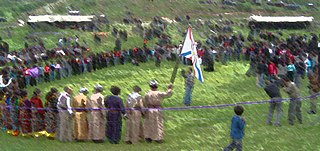 W
WThe culture of the Assyrians is both distinct from those of neighbouring ethnic groups as well as ancient. Many Assyrians still speak, read and write various Akkadian-influenced dialects of Eastern Aramaic, labelled by linguists as Northeastern Neo-Aramaic and Central Neo-Aramaic. They are predominantly adherents of several denominations of Syriac Christianity, notably the Ancient Church of the East, the Assyrian Church of the East, the Syriac Catholic Church and the Syriac Orthodox Church. Some are followers of the Assyrian Pentecostal Church and Assyrian Evangelical Church. A minority are secular or irreligious.
 W
WThe Aramean flag, or Syriac-Aramean flag, is the ethnic flag designated for the Arameans, adopted in 1980 by the Aramean journal Bahro Suryoyo of the Syriac federation in Sweden. Intended to represent their nation and homeland as well as the Aramean diaspora, the flag was design based on the Winged Sun symbol, replacing the sun by a torch symbolising the Holy Spirit in Christianity.
 W
WAssyrian folk dances are sets of dances that are performed throughout the world by Assyrians, mostly on occasions such as weddings, community parties and other jubilant events.
 W
WAzadoota is an Assyrian Australian worldbeat band formed in 1996 in Sydney, Australia that fuses traditional Assyrian pop and folk with Latin music. Its founder, Robin Zirwanda, the band's percussionist and lead singer, writes and sings the songs in Assyrian Neo-Aramaic. The name of the band Azadoota means 'freedom' in the Assyrian language.
 W
WAssyrian clothing varies from village to village throughout the Assyrian homeland and beyond.
 W
WThe davul, tapan, atabal or tabl is a large double-headed drum that is played with mallets. It has many names depending on the country and region. These drums are commonly used in the music of Middle East. These drums have both a deep bass sound and a thin treble sound due to their construction and playing style, where different heads and sticks are used to produce different sounds on the same drum.
 W
WKarum is the name given to ancient Assyrian trade posts in Anatolia from the ~25th to 18th centuries BC. The main centre of karum trading was at the ancient town of Kanesh.
 W
WKha b-Nisan, Ha b-Nisin, or Ha b-Nison, also known as Resha d-Sheta and as Akitu, or Assyrian New Year, is the spring festival among the indigenous Assyrians of northern Iraq, northeastern Syria, southeastern Turkey and northwestern Iran, celebrated on 1 April.
 W
WKültepe, also known as Kanesh, is an archaeological site in Kayseri Province, Turkey. The nearest modern city to Kültepe is Kayseri, about 20 km southwest. It consists of a tell, the actual Kültepe, and a lower town, where an Assyrian settlement was found. Its name in Assyrian texts from the 20th century BC was Kaneš; the later Hittites mostly called it Neša, occasionally Aniša. In 2014 the archaeological site was inscribed in the Tentative list of World Heritage Sites in Turkey. It is also the site of discovery of the earliest traces of the Hittite language, the earliest attestation of any Indo-European language, dated to the 20th century BC.
 W
WMelechesh is an ethnically Assyrian and Aramaic black metal and Mizrahi metal band that originated in Jerusalem, Israel and is currently based in Amsterdam, the Netherlands. Ashmedi started the band as a solo project in 1993. In the following year, guitarist Moloch and drummer Lord Curse were added to the line-up. The band's goal was to create a type of black metal incorporating extensive Middle Eastern influences mainly based on Assyrian (Mesopotamian) and occult themes ; the band invented the title "Mesopotamian metal" or "Sumerian Black Thrashing Metal" to best describe their type of metal. They are sometimes referred to as oriental metal.
 W
WOur Smallest Ally: a brief account of the Assyrian Nation in the Great War is a book published in 1920 by William A. Wigram.
 W
WPaska is a Ukrainian Easter bread tradition and particularly spread in countries with predominant Eastern Orthodox religious or cultural connections to the ancient Byzantine Empire. Paska breads are a traditional element in the Easter holidays of Ukraine, Armenia, Belarus, Romania, Russia, Georgia, Moldova and parts of Bulgaria, as well as Turkey, Iran and the Assyrian–Chaldean–Syriac diaspora. Due to its geographical closeness, it is also widespread in Slovakia. Meanwhile it is also eaten in countries with immigrant populations from Eastern Europe such as the United States, Canada and the United Kingdom.